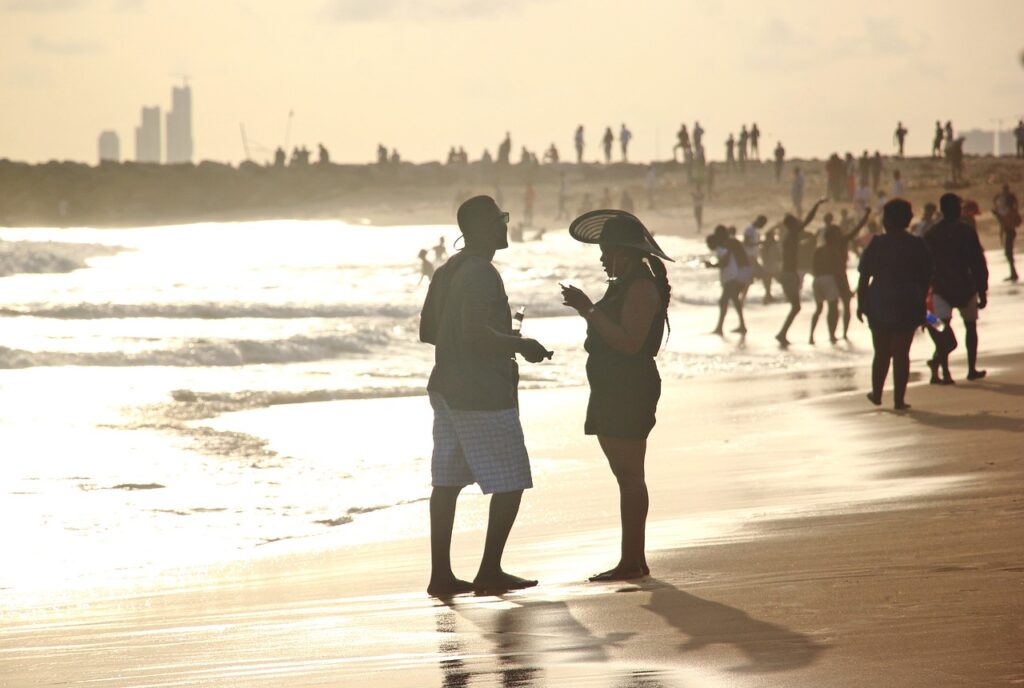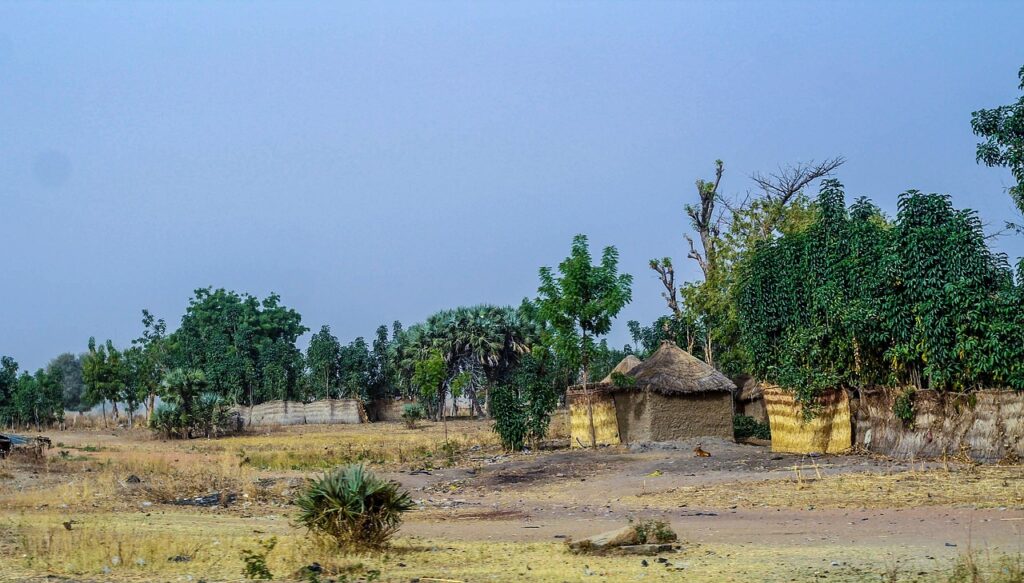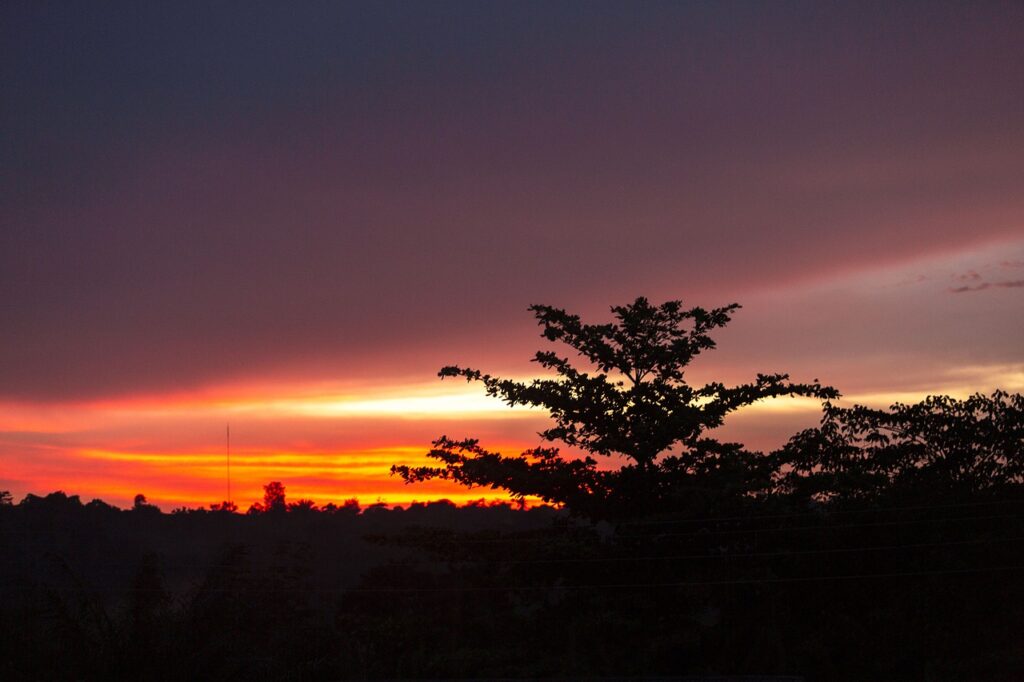As I stepped off the bus in Lagos, Nigeria, the cacophony of horns, chatter, and wailing sirens enveloped me like a warm hug. With nothing but a backpack full of worn-out clothes, a shrinking bank account, and a thirst for adventure, I found myself on a journey to explore the uncharted territories of Nigeria on a broke budget. What I didn’t know was that this trip would test my limits, challenge my perceptions, and leave me with indelible memories.
Nigeria is a country that wears its heart on its sleeve, often misunderstood and overlooked by travelers. From the vibrant streets of Lagos to the ancient kingdoms of the north, every region tells a unique story of resilience, culture, and beauty. As a broke backpacker, I was determined to experience it all-even if it meant roughing it out in budget-friendly accommodations, eating at local markets, and navigating the chaos of public transportation.
In this blog, let me take you through the ups and downs of budget traveling in Nigeria. From breathtaking natural scenery to warm, hospitable people, I will recount tales of my adventures, misadventures, and how such experiences have added to my wealth of knowledge over the years. So if you are ready for a very unconventional adventure, come with me as I explore uncharted territories of Nigeria-one broken backpack at a time.

How to get there:
While many travelers opt for flights, getting to Nigeria with public transportation from neighboring countries can be a fun and affordable adventure. In this blog post, we’ll explore the cheapest places to get flights from and provide a step-by-step guide on how to get to Nigeria with public transportation from neighboring countries.
Cheapest Places to Get Flights to Nigeria
If you’re looking for affordable flights to Nigeria, consider flying from the following countries:
- Ghana: Flights from Accra, Ghana to Lagos, Nigeria can cost as low as $100-$200 USD.
- Benin: Flights from Cotonou, Benin to Lagos, Nigeria can cost between $150-$300 USD.
- Togo: Flights from Lomé, Togo to Lagos, Nigeria can cost between $200-$400 USD.
You can use flight comparison websites like Skyscanner, Kayak, or Google Flights to find the cheapest flights.
Getting to Nigeria with Public Transportation from Neighboring Countries
If you’re looking for a more adventurous and affordable option, consider traveling to Nigeria with public transportation from neighboring countries. Here’s a step-by-step guide:
From Ghana
- Accra to Aflao: Take a tro-tro (minibus) from Accra to Aflao, the border town between Ghana and Togo. The journey takes around 4-5 hours and costs approximately 50-100 GHS ($8-$15 USD).
- Aflao to Lagos: From Aflao, take another tro-tro to Lagos, Nigeria. The journey takes around 10-12 hours and costs approximately 500-1,000 Naira ($1.50-$3 USD).
From Benin
- Cotonou to Seme: Take a taxi or moto (motorcycle) from Cotonou to Seme, the border town between Benin and Nigeria. The journey takes around 1-2 hours and costs approximately 1,000-2,000 XOF ($2-$4 USD).
- Seme to Lagos: From Seme, take a tro-tro or taxi to Lagos, Nigeria. The journey takes around 1-2 hours and costs approximately 500-1,000 Naira ($1.50-$3 USD).
From Togo
- Lomé to Badagry: Take a tro-tro or taxi from Lomé to Badagry, a coastal town in Nigeria. The journey takes around 4-5 hours and costs approximately 1,000-2,000 XOF ($2-$4 USD).
- Badagry to Lagos: From Badagry, take a tro-tro or taxi to Lagos, Nigeria. The journey takes around 1-2 hours and costs approximately 500-1,000 Naira ($1.50-$3 USD).
Tips and Precautions
- Visa requirements: Check the visa requirements for Nigeria and ensure you have the necessary documentation.
- Border crossings: Be prepared for long lines and potential delays at border crossings.
- Safety: Take necessary precautions to ensure your safety, especially when traveling at night.
- Health: Ensure you have all the necessary vaccinations and medications before traveling to Nigeria.
When to go:
As a broke backpacker, timing is everything, and understanding the best times to visit Nigeria can make all the difference. In this guide, we’ll break down the different times to visit Nigeria, including the best times for weather, festivals, and budget-friendly travel.
Weather
Nigeria has a tropical climate with two main seasons: wet and dry. The best time to visit Nigeria in terms of weather is during the dry season, which typically runs from November to March. During this time, the weather is dry and sunny, making it ideal for outdoor activities like hiking and exploring.
- Dry Season (November to March): Best time for weather, with dry and sunny conditions.
- Wet Season (April to October): Not ideal for outdoor activities, with heavy rainfall and high humidity.
Festivals and Celebrations
Nigeria is known for its vibrant culture and festivals, which are an excellent way to experience the country’s rich heritage. Here are some of the best festivals and celebrations to attend in Nigeria:
- Osun Osogbo Festival (August): A UNESCO-recognized festival that celebrates the goddess of fertility and prosperity.
- Eyo Festival (November): A colorful festival that celebrates the history and culture of Lagos.
- Calabar Carnival (December): A month-long celebration that features music, dance, and cultural performances.
Budget-Friendly Travel
As a broke backpacker, you’re always on the lookout for ways to save money. Here are some tips for budget-friendly travel in Nigeria:
- Avoid peak season: Prices for accommodations and transportation tend to be higher during peak season (December to January).
- Use public transportation: Public transportation in Nigeria is affordable and efficient, with options like buses and okadas (motorcycle taxis).
- Eat local food: Eating local food is not only delicious but also affordable, with options like jollof rice and suya (grilled meat skewers).
Best Time to Visit Nigeria
Based on the factors mentioned above, the best time to visit Nigeria as a broke backpacker is during the dry season (November to March). The weather is dry and sunny, making it ideal for outdoor activities, and the festivals and celebrations during this time are an excellent way to experience the country’s culture.
Here’s a summary of the best times to visit Nigeria:
- Best time for weather: Dry season (November to March)
- Best time for festivals: Osun Osogbo Festival (August), Eyo Festival (November), Calabar Carnival (December)
- Best time for budget-friendly travel: Avoid peak season (December to January), use public transportation, and eat local food.
Best Itineraries:
3-Day Itinerary
- Day 1: Lagos
- Explore the National Museum
- Visit the Eko Atlantic City
- Experience the nightlife at Victoria Island
- Day 2: Lagos to Abeokuta
- Take a bus to Abeokuta ( approx. 1 hour)
- Visit the Olumo Rock
- Explore the Abeokuta Market
- Day 3: Abeokuta to Lagos
- Return to Lagos by bus
- Visit the Lekki Conservation Centre
- Depart from Lagos
1-Week Itinerary
- Day 1-2: Lagos
- Explore the city’s markets and museums
- Visit the Eko Atlantic City and the National Theatre
- Day 3-4: Abeokuta
- Take a bus to Abeokuta
- Visit the Olumo Rock and the Abeokuta Market
- Day 5-6: Ibadan
- Take a bus to Ibadan
- Visit the University of Ibadan and the Ibadan Museum
- Day 7: Return to Lagos
- Take a bus back to Lagos
- Depart from Lagos
2-Week Itinerary
- Day 1-3: Lagos
- Explore the city’s markets and museums
- Visit the Eko Atlantic City and the National Theatre
- Day 4-6: Abeokuta and Ibadan
- Take a bus to Abeokuta and visit the Olumo Rock
- Continue to Ibadan and visit the University of Ibadan and the Ibadan Museum
- Day 7-9: Osogbo
- Take a bus to Osogbo
- Visit the Osun Osogbo Sacred Grove and the Osogbo Palace
- Day 10-14: Return to Lagos and explore nearby towns
- Take a bus back to Lagos
- Explore nearby towns like Badagry and Epe
1-Month Itinerary
- Week 1: Lagos and surrounding areas
- Explore the city’s markets and museums
- Visit the Eko Atlantic City and the National Theatre
- Take day trips to nearby towns like Badagry and Epe
- Week 2: South-West Nigeria
- Take a bus to Abeokuta and visit the Olumo Rock
- Continue to Ibadan and visit the University of Ibadan and the Ibadan Museum
- Visit Osogbo and explore the Osun Osogbo Sacred Grove and the Osogbo Palace
- Week 3: North-Central Nigeria
- Take a bus to Abuja and visit the National Assembly and the National Museum
- Continue to Jos and visit the Jos Museum and the Jos Wildlife Park
- Week 4: Return to Lagos and depart
- Take a bus back to Lagos
- Spend a few days relaxing in Lagos before departing
3-Month Itinerary
- Month 1: Explore South-West Nigeria
- Visit Lagos, Abeokuta, Ibadan, Osogbo, and other towns in the region
- Explore the region’s markets, museums, and cultural attractions
- Month 2: Explore North-Central Nigeria
- Visit Abuja, Jos, and other towns in the region
- Explore the region’s markets, museums, and cultural attractions
- Month 3: Explore North-East Nigeria and return to Lagos
- Visit Maiduguri, Yola, and other towns in the region
- Explore the region’s markets, museums, and cultural attractions
- Return to Lagos and depart
6-Month Itinerary
- Months 1-2: Explore South-West Nigeria
- Visit Lagos, Abeokuta, Ibadan, Osogbo, and other towns in the region
- Explore the region’s markets, museums, and cultural attractions
- Months 3-4: Explore North-Central Nigeria
- Visit Abuja, Jos, and other towns in the region
- Explore the region’s markets, museums, and cultural attractions
- Months 5-6: Explore North-East Nigeria, South-East Nigeria, and return to Lagos
- Visit Maiduguri, Yola, Enugu, and other towns in the regions
- Explore the regions’ markets, museums, and cultural attractions
- Return to Lagos and depart
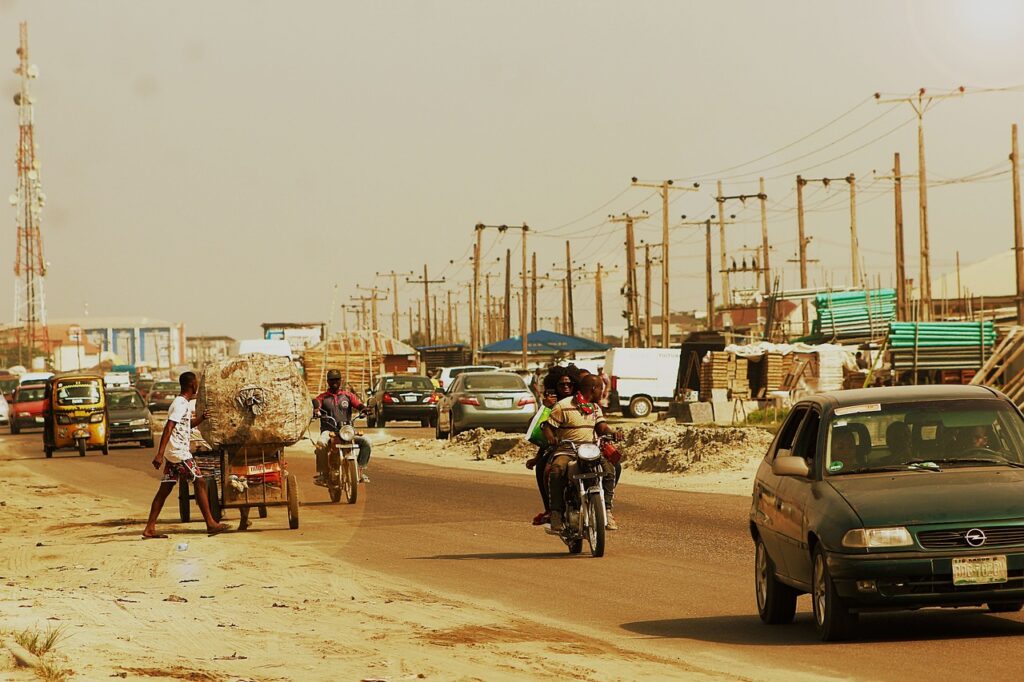
Transportation:
Nigeria has a vibrant and bustling transportation system. As a traveler, navigating the public transportation system can be challenging, but with the right information, you can get around easily and affordably. In this comprehensive guide, we’ll cover everything you need to know about public transportation in Nigeria, including hitchhiking.
Types of Public Transportation in Nigeria
Buses
Buses are the most common mode of public transportation in Nigeria. They operate on fixed routes and are an affordable way to get around. You can find buses at major bus terminals, such as the Lagos Bus Terminal or the Abuja Bus Terminal.
Danfos
Danfos are small, yellow buses that operate on fixed routes. They are a popular mode of transportation in urban areas and are known for their affordability.
Okadas
Okadas are motorcycles that operate as taxis. They are a convenient way to get around, especially in heavy traffic. However, be sure to negotiate the fare before you start your journey.
Keke Napep
Keke Napep are three-wheeled vehicles that operate as taxis. They are a popular mode of transportation in urban areas and are known for their affordability.
Hitchhiking in Nigeria
Hitchhiking is a great way to get around Nigeria, especially if you’re on a tight budget. According to (link unavailable), Nigeria is a relatively easy country to hitchhike in, with many friendly locals willing to give you a ride.
Best Places to Hitchhike
Some of the best places to hitchhike in Nigeria include:
- Major highways, such as the Lagos-Ibadan Expressway or the Abuja-Kaduna Highway
- Bus terminals, such as the Lagos Bus Terminal or the Abuja Bus Terminal
- Markets, such as the Balogun Market in Lagos or the Wuse Market in Abuja
Tips for Hitchhiking in Nigeria
Here are some tips for hitchhiking in Nigeria:
- Be respectful and friendly to drivers and locals
- Dress modestly and avoid carrying large amounts of cash
- Be prepared for long waits and potential delays
- Learn some basic Nigerian phrases, such as “hello” (bawo) and “thank you” (esan)
Safety Tips
- Always be aware of your surroundings and keep an eye on your belongings
- Avoid traveling at night, especially if you’re not familiar with the area
- Keep your valuables secure and consider using a money belt
- Avoid displaying signs of wealth, such as expensive jewelry or watches
Public transportation in Nigeria can be challenging, but with the right information and precautions, you can get around easily and affordably. Whether you’re taking a bus, danfo, okada, or keke napep, always be aware of your surroundings and keep an eye on your belongings. And if you’re feeling adventurous, consider hitchhiking – just be sure to follow the tips and precautions outlined above. Happy travels!
Top things to do:
Lagos Area
- National Museum: A great place to learn about Nigerian history and culture.
- Eko Atlantic City: A modern city built on reclaimed land, with great views of the Lagos skyline.
- Bar Beach: A popular beach with a lively atmosphere and affordable food and drinks.
- Lekki Conservation Centre: A nature reserve with a canopy walkway and great views of the surrounding area.
- Balogun Market: A bustling market selling everything from clothing to electronics.
- Computer Village: A market selling everything related to computers and electronics.
- Nike Art Gallery: A gallery showcasing traditional Nigerian art.
- Lagos Island: A historic island with a mix of colonial and modern architecture.
- Tarkwa Bay Beach: A secluded beach with a relaxed atmosphere.
South-West Nigeria
- Olumo Rock: A historic rock formation in Abeokuta, with great views of the surrounding area.
- Osun Osogbo Sacred Grove: A UNESCO World Heritage Site and sacred grove, with beautiful scenery and historic significance.
- Ibadan Museum: A museum showcasing the history and culture of Ibadan and the surrounding area.
- Abeokuta Market: A bustling market selling everything from clothing to food.
- Ijebu Ode: A historic town with a mix of traditional and modern architecture.
- Erin Ijesha Waterfalls: A series of waterfalls with stunning natural beauty.
- Osogbo Palace: A historic palace with a mix of traditional and modern architecture.
- Ile-Ife: A historic town with a rich cultural heritage.
North-Central Nigeria
- National Assembly: The seat of Nigeria’s federal government, with guided tours available.
- National Museum: A museum showcasing the history and culture of Nigeria, with a focus on the North-Central region.
- Jos Museum: A museum showcasing the history and culture of Jos and the surrounding area.
- Jos Wildlife Park: A wildlife park with a variety of animals, including lions, monkeys, and crocodiles.
- Kaduna: A historic city with a mix of traditional and modern architecture.
- Zaria: A historic city with a rich cultural heritage.
- Kajuru Castle: A medieval-style castle with stunning views of the surrounding area.
- Kaduna River: A scenic river with opportunities for boat cruises and fishing.
North-East Nigeria
- Maiduguri Museum: A museum showcasing the history and culture of Maiduguri and the surrounding area.
- Yola Market: A bustling market selling everything from clothing to food.
- Gashaka-Gumti National Park: A national park with a variety of wildlife, including elephants, lions, and monkeys.
- Mubi: A historic town with a rich cultural heritage.
- Michika: A scenic town with stunning views of the surrounding mountains.
- Madagali: A historic town with a mix of traditional and modern architecture.
- Lake Chad: A scenic lake with opportunities for boat cruises and fishing.
South-East Nigeria
- Enugu Museum: A museum showcasing the history and culture of Enugu and the surrounding area.
- Onitsha Market: A bustling market selling everything from clothing to electronics.
- Ogbunike Caves: A series of caves with stunning natural beauty and historic significance.
- Aba: A historic city with a rich cultural heritage.
- Owerri: A scenic city with stunning views of the surrounding area.
- Imo State Zoo: A zoo with a variety of animals, including lions, monkeys, and crocodiles.
- Agulu Lake: A scenic lake with opportunities for boat cruises and fishing.
South-South Nigeria
- Port Harcourt Museum: A museum showcasing the history and culture of Port Harcourt and the surrounding area.
- Rivers State Cultural Centre: A cultural centre with a variety of traditional Nigerian art and crafts.
- Bonny Island: A scenic island with stunning views of the surrounding area.
- Kalabari Kingdom: A historic kingdom with a rich cultural heritage.
- Opobo Kingdom: A historic kingdom with a mix of traditional and modern architecture.
- Andoni Beach: A scenic beach with stunning views of the surrounding area.
Food:
Food paradise is the word that describes Nigeria, for it is a country offering all kinds of dishes reflecting its rich cultural heritage. From spicy jollof rice down to savory suya, Nigerian cuisine is a fusion of traditional and modern flavors that will leave your taste buds dancing. Because a broke backpacker, your wallet will thank you with meals in Nigeria, that would easily go as low as 500 Naira, which happens to be $1.25 USD, should one intend to eat from a local restaurant or food stall.
One of the best things about Nigerian food is just how diverse it is, for certain. With over 250 ethnic groups, each with unique culinary traditions, there really is always something new that one can have. In the north, you’ll find dishes like tuwo shinkafa, a hearty rice dish made with meat or fish, and miyan kubewa, a spicy stew made with meat or vegetables. In the south, you’ll find dishes like jollof rice, a flavorful one-pot dish made with rice, tomatoes, and spices, and egusi soup, a thick and nutritious soup made with melon seeds and vegetables.
Street food is also a big part of Nigerian cuisine, with vendors selling everything from roasted plantains to grilled meat skewers. One of the most popular street foods is suya: thinly sliced pieces of meat-usually beef or chicken-marinated in a spicy peanut sauce and grilled over an open flame. Another popular street food is puff-puff: deep-fried dough balls sprinkled with sugar and served as a snack.
In addition to street food, Nigeria also boasts a great restaurant scene-from traditional Nigerian restaurants to modern fusion eateries. You’ll also find restaurants in Lagos such as Yellow Chili, with modern Nigerian dishes prepared using fresh, locally sourced ingredients. In Abuja, you will find restaurants such as Wakkis that serve traditional Nigerian dishes like jollof rice and egusi soup.
As a poor backpacker, you’ll be happy to hear that eating in Nigeria can be super cheap. You can find meals for as low as 500 Naira ($1.25 USD) at local restaurants or food stalls, and even cheaper from street food stalls or markets. Just make sure you always eat at reputable establishments and follow proper food safety to avoid getting sick.
Nigerian cuisine is also heavily influenced by the country’s cultural and religious heritage. For example, you will find that in the north, there are a lot of dishes influenced by Islamic cuisine, such as kebabs and couscous. In the south, you will find a lot of dishes influenced by traditional Nigerian cuisine, such as jollof rice and egusi soup.
But, in addition to the variety of dishes, Nigerian cuisine is also noted for its bold flavors and spices. From the spicy peanut sauce used in suya to the flavorful tomato stew used in jollof rice, Nigerian cuisine is all about bold flavors and spices. And with the country’s abundance of fresh fruits and vegetables, you’ll always find something fresh and delicious to eat.
Another aspect of Nigeria that you may also notice as you travel throughout the country is how big food seems to play a role in the culture and traditions of the country. For example, in many Nigerian cultures, food is a very hospitable and generous way to show welcome. You can expect to be taken out for a great meal if invited to a Nigerian’s home, with common dishes such as jollof rice and egusi soup.
In the end, Nigerian food is a reflection of the cultural heritage of the country, comprising many dishes that are sure to thrill your taste buds. Whether it’s eating at a local restaurant, street food stall, or market, you’re sure to find something delicious and affordable. So come and explore the flavors of Nigeria-your taste buds will thank you!
As you explore more of the food in Nigeria, it would also become obvious that indeed, the country has a plethora of food cultures, highly differentiated by region and ethnicity. For instance, in the northern part, you’ll encounter many dishes that are rather influenced by Islamic cuisine, such as kebabs and couscous. In the south, you’ll find a lot of dishes that are influenced by traditional Nigerian cuisine, such as jollof rice and egusi soup.
Besides the variety of foods, Nigerian cuisine is also bold in flavors and spices. From the spicy peanut sauce used in suya to the flavorful tomato stew used in jollof rice, Nigerian cuisine is all about bold flavors and spices. And with the abundance of fresh fruits and vegetables within the country, you’ll always find something fresh and delicious to eat.
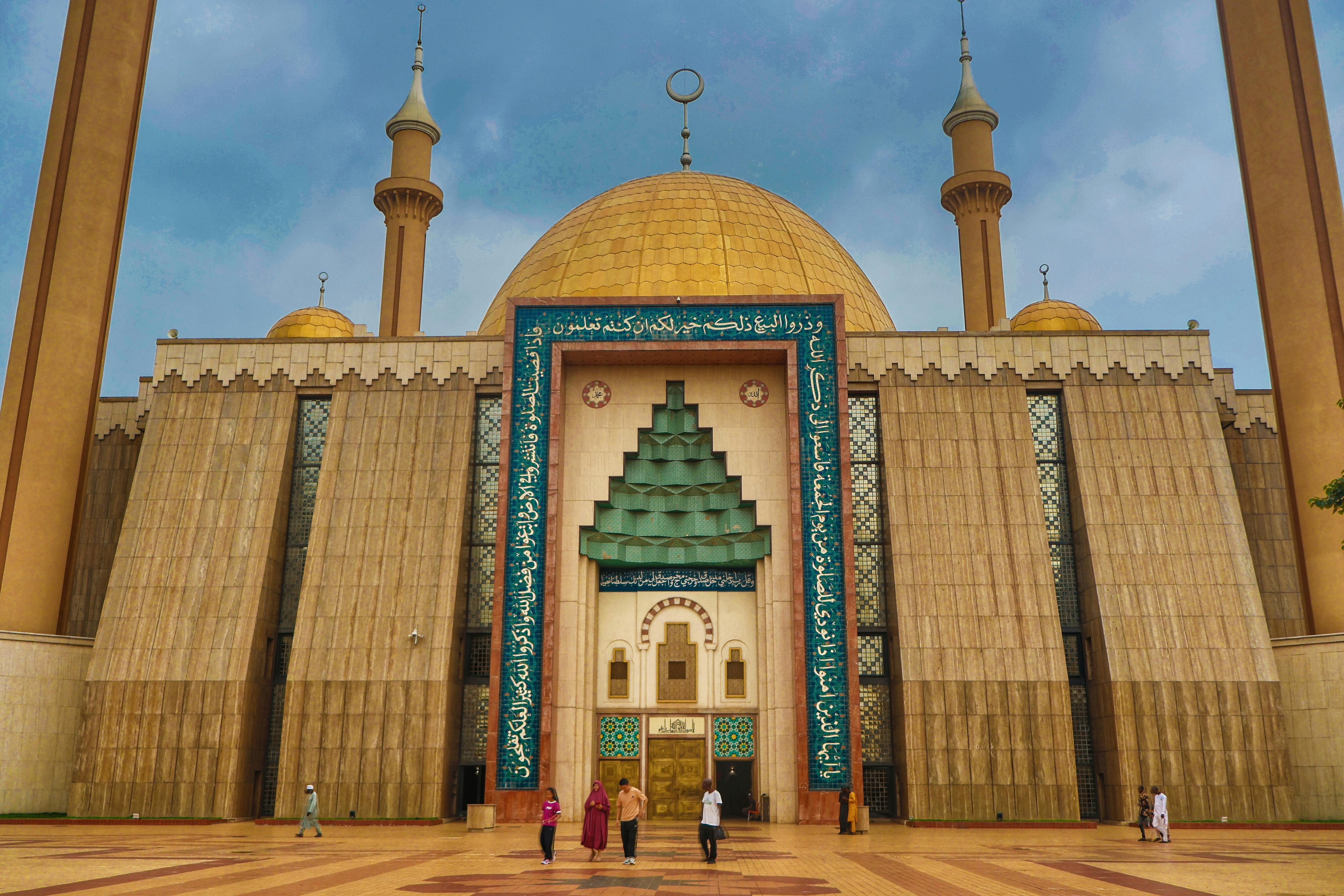
Culture:
From a complex history, geography, and interaction between the different ethnic groups, Nigeria is rich in culture. With more than 250 ethnic groups, each with their traditions, customs, and languages, Nigerian culture is varied and a tapestry of influences and expressions.
At the heart of Nigerian culture is a strong sense of community and family. In many Nigerian societies, the extended family is the basic unit of social organization, and family ties are highly valued. Respect for elders and tradition is also deeply ingrained in Nigerian culture, with many communities placing great emphasis on the wisdom and knowledge of their older members.
Some aspects of Nigerian culture are represented in its rich artistic expression and a wide range of forms of traditional art, ranging from woodcarvings to textiles and pottery. Then, Nigerian culture extends to music and dance that flows with a wide variety, from Afrobeat to Highlife. These two dimensions bring energy and vitality into both Nigerian music and dance while being part of many kinds of social and cultural gatherings.
Equally part of Nigerian life is the multitude of festivals and celebrations, which together with other attributes, express the country’s cultural heritage. From the Osun Osogbo Festival, celebrating the goddess of fertility and prosperity, to the Eyo Festival, keeping alive the memory of the Lagos king, these are occasions for communities to come together, celebrate heritage, and showcase cultural tradition.
Besides its rich cultural heritage, Nigeria is also a country of great resilience and adaptability. Though beset by many challenges-poverty, corruption, and conflict-Nigerians are known for their warmth, hospitality, and generosity. Visitors to the country are often struck by the friendly and welcoming nature of the Nigerian people, who are always eager to share their culture, traditions, and way of life with others.
The complex history of Nigeria, influenced by many different factors, such as colonialism, slavery, and Islamic and Christian traditions, also contributes to shaping its culture. This complex history is reflected in the country’s cultural heritage, with many different influences and traditions evident in its art, music, literature, and other forms of cultural expression.
Despite all the challenges, Nigeria happens to be a country with very active and engaging cultural scenery, which is expressed by its numerous festivals, events, and cultural activities. From the Lagos International Jazz Festival to the Abuja International Film Festival, there are many opportunities for visitors to experience Nigerian culture firsthand and to learn more about the country’s rich and diverse heritage.
In most Nigerian societies, culture is not just a form of artistic expression but a way of life. It reflects in the way they dress, the food they eat, the music they listen to, and the way they interact with one another. Nigerian culture is dynamic and keeps evolving with each passing day. It has been molded by the complex history, geography, and social and economic context of the country.
As a visitor to Nigeria, there is no better way to learn more about the people, traditions, and ways of life than to submerge yourself in the culture. Whether you attend a traditional festival, visit a local market, or simply spend time with Nigerian friends and family, you are sure to gain a deeper understanding and appreciation of Nigerian culture.
One of the fascinating features of Nigerian culture is the richness in its tradition of storytelling. Most stories in many Nigerian societies serve to transmit the history, cultural values, and traditions from generation to generation. These stories are told by way of music, dancing, and theater and remain an important part of the Nigerian cultural heritage.
Nigerian culture is also identified with pulsatingly colored textiles employed in a wide range of clothes, fabrics, and other decorative items. From the intricate patterns and designs on traditional Nigerian wear to the colors used for modern Nigerian fashion, there is little that can match the role of textiles in Nigerian cultural expression.
Besides its rich cultural heritage, Nigeria is a country with a strong sense of community and social responsibility. In many Nigerian societies, community service and volunteerism are highly valued, and many people are actively involved in community development projects and initiatives.
Equally, Nigerian culture is determined by the complex geography that varies from tropical rainforests in the south to arid deserts in the north. The geography of the country has greatly influenced the culture, whereby many communities have developed their unique traditions and customs adapted to their local environment.
As a visitor to Nigeria, experiencing the culture firsthand will give you a great insight and appreciation for its people, traditions, and ways of life. Be it the attendance of a traditional festival, visits to a local market, or just time spent with friends and family in Nigeria, you are sure of receiving warm welcomes and getting an insight into Nigerian culture that few outsiders ever get.
Accommodations:
As a poor backpacker, you are looking to find something affordable and unusual to stay in. Nigeria has so much to offer in terms of culture and city life. For a truly unforgettable, crazy experience, though, we really advise avoiding middle-range hotels and instead finding the very cheapest hostels and guesthouses.
While they may lack some frills compared to a five-star hotel, these no-frills establishments more than makeup for that in unique charm and character. Everything from the way the decorations are in rainbow colors down to the exuberant atmosphere oozes out of every aspect of a budget hostel that is simply typical of Nigerian cultures.
One of the best things about staying in a cheap hostel in Nigeria is the opportunity to meet and interact with fellow travelers and locals alike. These establishments often have a communal atmosphere, with shared rooms and common areas where guests can gather and socialize. It’s not uncommon to find yourself engaged in lively debates or impromptu jam sessions with your fellow travelers.
Another advantage of staying in a budget hostel is the flexibility it offers. With no fancy amenities or services to worry about, you’re free to come and go as you please, exploring the city and all its wonders without breaking the bank.
Of course, there are also the quirky and unexpected experiences that come along in a stay within a hostel that is rather cheaply available. From the eccentric owners telling stories of Nigerian history and culture to the impromptu power outage that sends everybody scrambling for candles and flashlights, every day in a budget hostel is an adventure.
For all those broke backpackers out there looking for a really unique, unforgettable experience in Nigeria, ditch the mid-range hotels for the cheapest hostels you could find. With their colourful decor, lively atmosphere, and quirky charm, these establishments are the perfect places to meet fellow travelers, immerse yourself in local culture, and experience the thrill of budget travel in Nigeria.
As you make your way through the streets of Lagos, Abuja, or any other Nigerian city, look out for the small, modest buildings that host these hostels. They may appear unassuming from the outside, but believe us, a lot of character and charm is hidden inside. And who knows, you may even stumble upon hidden treasures or two, hostels so quirky and offbeat that they become the most remembered thing about your whole trip.
In Nigeria, it’s not just about getting accommodations at a cheap price; it’s about the culture you’d be putting yourself into, an adventure that comes along with it. So, don’t be afraid to take the plunge and book that cheap hostel-you never know what amazing experiences and unforgettable memories you’ll create.
As you unpack your luggage in the hostel, you’ll soon find yourself surrounded by other guests that are as adventurous and open-minded as yourself. You’ll find fellow travelers from all different parts of the world who have a story to tell and experiences to share, and as you share your stories and advice, you create a feeling of comradeship and belonging that’s a little difficult to find when staying in higher-class lodging.
Of course, staying in a budget hostel in Nigeria also means being prepared for the unexpected. From power outages to water shortages, you’ll need to be flexible and adaptable to make the most of your stay. But trust us, the rewards are well worth it. For in Nigeria, budget accommodation is not just about finding a cheap place to sleep, it’s about immersing yourself in the local culture and experiencing the thrill of adventure.
Exploring Nigerian cities and towns, one steadily learns that the budget hostel does not just serve sleeping accommodations; it’s a real inlet to the local culture and the community. You make use of the locals being anxious to share their understanding with you, and perhaps have the opportunity to go along with local customs and tradition.
So, if you’re looking for a truly unique and unforgettable experience in Nigeria, take the plunge and book that cheap hostel. Colorful decor, lively atmosphere, and quirky charm make them the perfect place to meet fellow travelers, immerse yourself in local culture, and experience the thrill of budget travel in Nigeria.
Nightlife:
With its renowned cultural heritage, vibrant cities, and warm reception, Nigeria has a nightlife scene that is as varied as it is exciting. Be it in the streets of Lagos or the trendier bars and clubs in Abuja, nightlife in Nigeria is definitely a mirror of the pulsating energy of the country’s creativity and zest for life.
As the sun sets over the Nigerian landscape, the streets come alive with music, laughter, and the sound of revving engines. The nightlife scene is a kaleidoscope of colors, sounds, and experiences, with something for every taste and preference. Whether you’re looking for a relaxed evening of live music and fine dining or a wild night of dancing and partying, Nigeria’s nightlife has got you covered.
Perhaps the most striking thing about nightlife in Nigeria is its diversity. From the traditional bars and clubs of the big cities to the more laid-back, informal gatherings of the smaller towns and villages, there’s a nightlife scene to suit every style and budget. With over 200 million people, something is always happening somewhere.
Nightlife in Nigeria is deeply rooted in the country’s rich cultural heritage, too. Traditional music and dance are integral parts of the nightlife scene, with many bars and clubs featuring live performances of afrobeat, highlife, and other popular Nigerian genres. And with the country’s many ethnic groups each having their own unique cultural traditions and customs, there’s always something new and exciting to discover.
As you explore the nightlife scene of Nigeria, you will be sure to notice that warm hospitality and welcoming nature the country is so famous for. Nigerians love their music, dancing, and celebration, and the same applies to the nightlife scenes. Whether you are a local or a visitor, you will always be made to feel welcome and included in the fun.
Of course, the Nigerian nightlife scene is not completely devoid of challenges. For one, safety in certain areas, especially at night, can be an issue, and visitors are recommended to take all possible precautionary measures to keep safe. Besides, infrastructure sometimes is a challenge, and it is not uncommon to see power outages or experience traffic congestion. However, for the most part, Nigeria’s nightlife scene is a vibrant and exciting place to be, full of energy, creativity, and passion.
As the night wears on and the music gets louder, you’ll find yourself swept up in the infectious energy of Nigeria’s nightlife scene. Whether you’re dancing the night away in a crowded club or just having a quiet drink with friends in a cozy bar, you’ll know you’re experiencing something truly special.
The nightlife scene in Nigeria is also a great place to meet new people and make friends. Nigerians are known for their warm hospitality and welcoming nature, and visitors are often surprised by the ease with which they can strike up conversations and make connections with locals.
You will also realize, while exploring the nightlife in Nigeria, that Nigerians just love music and dancing. From the traditional afrobeat and highlife sounds that fill the air in many bars and clubs, to the modern hip-hop and R&B that is popular among younger Nigerians, music is an integral part of the nightlife scene.
And then, of course, there is the food: Nigerian cuisine is a beautiful mix of cultures and influences, and this no less applies to the nightlife scene. From spicy jollof rice and suya, popular street foods, to more formal sit-down meals available in many restaurants and bars, there is something to suit every taste and budget.
As the night wears on, and the music volume rises, you’ll find yourself wrapped in the infectious energy of Nigeria’s nightlife scene. Be it dancing away to eternity in a crowded club or over a quiet drink with friends in a cozy bar-you’ll know you’re living a dream.
It’s also very important socially for Nigerians as their night life represents their means of association and social interactions among other people. People see nighttime in Nigeria not only for fun but a form of reuniting themselves with others like family and friends; indeed, visitors will mostly always be welcomed into that society with open arms.
You will also notice, while exploring the nightlife in Nigeria, how creativity and entrepreneurial spirit permeate every part of the country-from the small, informal bars and clubs springing up in the most unexpected places to the more formal, established venues that offer a wide range of entertainment options.
Backpacking Nigeria costs:
Daily Budget:
- Accommodation: ₦500-₦1,000 ( approx. $1.25-$2.50 USD) per night for a shared room in a budget hostel or guesthouse
- Food: ₦200-₦500 (approx. $0.50-$1.25 USD) per meal for street food or local restaurants
- Transportation: ₦50-₦200 (approx. $0.12-$0.50 USD) per ride for public transportation or taxis
- Attractions: ₦100-₦500 (approx. $0.25-$1.25 USD) per person for entrance fees to attractions and national parks
- Miscellaneous: ₦500-₦1,000 (approx. $1.25-$2.50 USD) per day for souvenirs, snacks, and other incidentals
Total daily budget: ₦2,350-₦4,200 (approx. $5.88-$10.50 USD)
Weekly Budget:
- Accommodation: ₦3,500-₦7,000 (approx. $8.75-$17.50 USD) per week for a shared room in a budget hostel or guesthouse
- Food: ₦1,400-₦3,500 (approx. $3.50-$8.75 USD) per week for street food or local restaurants
- Transportation: ₦350-₦1,400 (approx. $0.88-$3.50 USD) per week for public transportation or taxis
- Attractions: ₦700-₦2,100 (approx. $1.75-$5.25 USD) per week for entrance fees to attractions and national parks
- Miscellaneous: ₦3,500-₦7,000 (approx. $8.75-$17.50 USD) per week for souvenirs, snacks, and other incidentals
Total weekly budget: ₦12,800-₦28,100 (approx. $31.88-$70.25 USD)
Note: These estimates are rough and can vary depending on individual circumstances and exchange rates. Additionally, prices may be higher in major cities like Lagos and Abuja, and lower in smaller towns and rural areas.
Conclusion:
As you conclude your journey through Nigeria as a broke backpacker, the experiences that you have amassed will likely leave you feeling a little excited, exhausted, and perhaps a bit nostalgic. You will have found a raw, vibrant country full of life despite the challenges and uncertainties that come with traveling on a broke budget.
Nigeria is a complex and contradictory country that will leave you with more questions than answers, but it’s just this uncertainty that makes traveling here so rewarding. As a broke backpacker, you will have been forced to navigate unfamiliar terrain, rely on the kindness of strangers, and adapt to situations that would have been unimaginable just a few days before.
And yet, despite it all, you will still have found those moments of beauty, joy, and connection that you will carry well after you leave Nigeria’s shores. You would have uncovered some hidden treasures, unlikely friendships, and a deeper appreciation for the resilience and warmth of Nigerian people.
As you pack up and get ready to leave Nigeria, you will know that this is something truly special, a journey that has put you through your paces, opened your horizons, and given you cause to appreciate more fully than ever before the beauty and intrigue of this incredible country.
